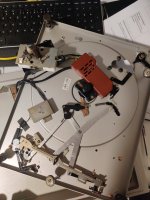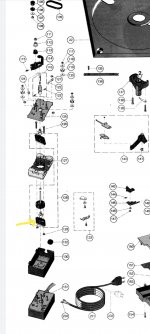Bloodlemons
Well-Known Member
I did not realize this was a thread. Happy to help!
Well I think the motor on my Dual 505 is dead or dying
Without the belt the shaft (where the pitch control is) doesn't turn. I can sort of give it push and you feel it trying to start and some torque but it won't continue turning.
I see replacement motor boxes on eBay and dual Fred. I think I should be able to disassembly and reassemble it...what do you guys think?


Experimenting with a Vinyl Flat has brought to light what I think is maybe a turntable setup issue, or maybe just a fact of life when dealing with how a cartridge handles a very small and sudden warp on a record.
I flattened what was a very warped record to what appears at first glance to be pretty much flat...went to play it, and now get an audible thump in the speakers when the needle hits where I assume the warp was before (this didn't happen, of course, when the warp was large).
Closer inspection revealed that there is still the most miniscule of warp and the cartridge visibly gets rattled at this spot, syncing up with the noise...captured the video below...the noise doesn't really come through, but it's definitely there loud enough to hear from across the room
and a video of the effect on the speaker
I know i've seen this issue before on other records where it will last for a track or so and go away, but I've never actually looked at what's happening with the cartridge and wonder if this is maybe an issue with my setup or if there's any tactics to alleviate it.
Or maybe just a normal annoying thing that all turntables experience with records with tiny warps...however, whatever it is, it's making me gun-shy on trying to flatten any more records because I'm afraid that this will happen with all of them.
Any wisdom is greatly appreciated.
Turntable is Pioneer PLX-1000What is your turntable? What is your amplifier and phono stage?
Have you noticed this issue with other albums you have not flattened?
I have some ideas, but would like more info first to make sure I’m on the right track.
Turntable is Pioneer PLX-1000
Phono stage is Vincent Pho-8
Amp is Onkyo TX-8020
I have experienced this issue with records I haven't flattened, but not a large number of them. Just confirmed it with a few other records that I recalled having similar issues with. Common thread seems to be very very small warps in the record that jar the cartridge like in the video. The system seems to take on larger warps with no problem.
I'll check that out later tonight and report back. Thanks!Some woofer pumping from subsonic energy (what you are seeing) is normal. You have more of it than I’d like to see. It also wastes amplifier power, as the woofers are being excited with no audible benefit.
The cartridge is a good match to the arm, so that’s not the issue.
The PLX-1000 is known for some examples having slightly loose arm bearings. I wonder if that is causing the issue. I’d like you to check. To do this, lift the arm gently off of the arm rest. See if you can gently move the arm forwards and backwards. Is the arm solid or do you feel any play? Do you hear a soft click? If you do, or if you especially hear a click, the horizontal bearings are loose.
Let me know if your PLX passes the test. The movement (if any) will be slight but obvious. A click is an automatic fail.
If it fails, it’s an easy fix. Mine were loose on my PLX straight from the box.
Sorry, I didn't end up getting to this today. Checked the tonearm, and the bearings seem pretty sturdy...not hearing any clicking or feeling any wobble. I believe you actually stepped me though tightening them when I first got the unit, but I wanted to make sure they hadn't loosened again.Some woofer pumping from subsonic energy (what you are seeing) is normal. You have more of it than I’d like to see. It also wastes amplifier power, as the woofers are being excited with no audible benefit.
The cartridge is a good match to the arm, so that’s not the issue.
The PLX-1000 is known for some examples having slightly loose arm bearings. I wonder if that is causing the issue. I’d like you to check. To do this, lift the arm gently off of the arm rest. See if you can gently move the arm forwards and backwards. Is the arm solid or do you feel any play? Do you hear a soft click? If you do, or if you especially hear a click, the horizontal bearings are loose.
Let me know if your PLX passes the test. The movement (if any) will be slight but obvious. A click is an automatic fail.
If it fails, it’s an easy fix. Mine were loose on my PLX straight from the box.
Experimenting with a Vinyl Flat has brought to light what I think is maybe a turntable setup issue, or maybe just a fact of life when dealing with how a cartridge handles a very small and sudden warp on a record.
I flattened what was a very warped record to what appears at first glance to be pretty much flat...went to play it, and now get an audible thump in the speakers when the needle hits where I assume the warp was before (this didn't happen, of course, when the warp was large).
Closer inspection revealed that there is still the most miniscule of warp and the cartridge visibly gets rattled at this spot, syncing up with the noise...captured the video below...the noise doesn't really come through, but it's definitely there loud enough to hear from across the room
and a video of the effect on the speaker
I know i've seen this issue before on other records where it will last for a track or so and go away, but I've never actually looked at what's happening with the cartridge and wonder if this is maybe an issue with my setup or if there's any tactics to alleviate it.
Or maybe just a normal annoying thing that all turntables experience with records with tiny warps...however, whatever it is, it's making me gun-shy on trying to flatten any more records because I'm afraid that this will happen with all of them.
Any wisdom is greatly appreciated.
In that case, I’d look seriously at the KAB TD-1200 tonearm damper. It’ll solve both issues. I ran one on my PLX-1000 and loved it.Sorry, I didn't end up getting to this today. Checked the tonearm, and the bearings seem pretty sturdy...not hearing any clicking or feeling any wobble. I believe you actually stepped me though tightening them when I first got the unit, but I wanted to make sure they hadn't loosened again.
View attachment 97458
So after taking it all apart my motor turns by itself however it doesn't turn when I put this (yellow arrow) piece back. I believe that's the bearing and therefore the issue is probably lube.... Do you think I'm on the right track?
View attachment 97459
Can anyone recommend lube to use and how much?
@siremobunny here’s a great explanation of what you are experiencing and why the TD-1200 works. Lifted from KAB:In that case, I’d look seriously at the KAB TD-1200 tonearm damper. It’ll solve both issues. I ran one on my PLX-1000 and loved it.
Leave your phono stage as is. You are fine.Not sure where to ask this question, but trying to properly set the dip switches on my phono preamp. I am using an Audio Technica 540ml cartridge.
Cart Specs: 47k ohm
Recommended Load Capacitence : 100- 200 pF
My phono stage is set at 47k ohms with a gain is set a 40 db for the MM cartridge.
With default settings, the phonostage has a capacitance of 47 pF.
Now I've read that RCA cables from the turntable can have a capacintence of 100 pF (or less). I have no way to measure this, but with the cable and the default preamp settings that'd put me at 147pF, perfect for the 540ml. I can also bump up the default 47 pF to 147pF on the preamp, but without knowing the cable capacitance that may put me over the recommedned 200 pF for the cartridge. Does it matter? Any advice?
Do you know with these if the fluid in the damper needs to be changed out periodically? I watched a video on the installation and it doesn't look too bad, but I'm curious about the maintainance.@siremobunny here’s a great explanation of what you are experiencing and why the TD-1200 works. Lifted from KAB:
All tonearms vibrate at the arm cartrige resonant frequency. This causes the speakers to motion in and out modulating the soundstage. Fluid damping stabilizes this behaviour and brings greater stability to the soundstage. Your amplifiers are also over reacting to this very low frequency signal and that can cause even more problems.
It would be better if we could call this behavior "Dynamic Ridgidity" for that better describes what is happening. Functionally when a tonearm reacts to the resonant frequency it produces a peak of output energy. This is seen as woofer pumping which is essentially the stylus over reacting to a small warp in the records surface. Fluid damping stops the stylus from over reacting. That is what is "damped". It all occurs at frequencies below 10 hz and has no impact whatsoever on audible dynamics. In otherwords, do not confuse damping of resonance with damping of dynamics they are not related in any way.
Above 10 Hz the arm is seen to be even more ridgid at any single point in time and as a result the stylus traces the groove with even more precision. The biggest sonic effect is to make the sound stage more "Still". This can be subtle to some, overwhelming to others. It all depends on your listening priorities.
There isn’t any maintenance. And it’s not “fluid” per se. It’s more like goop. It’s easy to install.Do you know with these if the fluid in the damper needs to be changed out periodically? I watched a video on the installation and it doesn't look too bad, but I'm curious about the maintainance.
oh what the hell, I'm gonna go for it. It looks like the one that fits the PLX-1000 is actually $20 less than the one you linked...There isn’t any maintenance. And it’s not “fluid” per se. It’s more like goop. It’s easy to install.
The one you linked does not fit the Pioneer. Look at the red text in the center of the page.oh what the hell, I'm gonna go for it. It looks like the one that fits the PLX-1000 is actually $20 less than the one you linked...
thanks for the help
yeah, it's something funky with their page...if you try to link to the right one, the link takes you.to the wrong one. Rest assured, I know which one I actually need (TD-1200)...lolThe one you linked does not fit the Pioneer. Look at the red text in the center of the page.